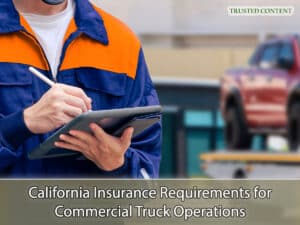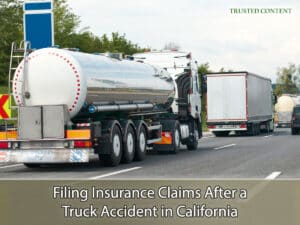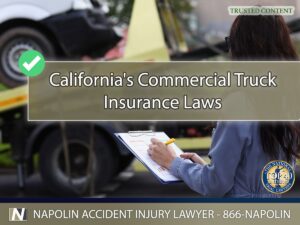An Overview of California’s Commercial Truck Insurance Laws
Commercial truck insurance is a critical aspect of operating a commercial vehicle in California. The state's laws are designed to ensure that trucking companies and drivers are financially responsible for any damages or injuries they may cause. Understanding these requirements is essential for compliance and for protecting the rights of accident victims.

California Insurance Requirements for Commercial Truck Operations
California Insurance Requirements for Commercial Truck Operations
In California, commercial truck drivers who transport goods, operate large commercial vehicles, handle hazardous materials, or use vehicles requiring a commercial driver's license must obtain a Motor Carrier Permit (MCP). This permit confirms their registration with the DMV and their California Carrier Identification number (CA#).
Who Needs an MCP
- Individuals or businesses paid to transport property in their vehicles, regardless of size or type.
- Companies that transport goods for compensation, classified as ‘for-hire' motor carriers.
- Operators of commercial vehicles with a Gross Vehicle Weight Rating (GVWR) of 10,001 pounds or more, used for both commercial and private purposes.
- Entities hauling personal goods or property, identified as ‘private' motor carriers.
- Drivers of vehicles transporting hazardous materials.
- Operators of vehicle combinations exceeding 40 feet in length, such as motor trucks and trailers (excluding camp and utility trailers).
- Drivers of any motor vehicle or vehicle combination requiring a commercial driver license.
Insurance Requirements
The liability insurance requirements range from $300,000 to $5,000,000 (combined single-limit coverage), depending on the type of vehicle and cargo. Proof of insurance must be provided via one of the following forms:
- Certificate of Insurance (MC 65 M) from the insurance provider.
- Certificate of Self Insurance (MC 131 M), applicable for motor carriers with 25 or more commercial vehicles and a liability coverage requirement not exceeding $750,000.
Federal Insurance Requirements for Interstate Commercial Truck Operations
The Federal Motor Carrier Safety Administration (FMCSA) requires specific insurance and legal process agent documentation for motor carriers, freight forwarders, and brokers operating interstate. These requirements vary depending on the type of registration.
Insurance Filing Requirements by Form
- BMC-91 or BMC-91X: Public liability insurance covering bodily injury, property damage, and environmental restoration. Required for motor carriers and freight forwarders.
- BMC-34 or BMC-83: Cargo insurance of $5,000 per vehicle and $10,000 per occurrence, in addition to BMC-91 or BMC-91X. Required for household goods motor carriers and freight forwarders.
- BMC-84 or BMC-85: Surety bond or trust fund agreement of $75,000. Required for freight forwarders and freight brokers.
- MCS-90: Endorsement for motor carrier insurance policies for public liability under sections 29 and 30 of the Motor Carrier Act of 1980. Required for hazardous materials carriers.
Applicants must ensure their insurance agents file the necessary forms as soon as they obtain their docket number. These filings must be submitted within 90 days after the FMCSA announces the intent to register the applicant.
Additional Insurance Options for Commercial Trucks
Beyond the mandatory liability and cargo insurance, there are several optional insurance policies that commercial truck owners may consider to further protect their investments and manage risks. Some of these optional coverages include:
Limited Depreciation Insurance
Limited depreciation insurance provides coverage for the depreciated value of the truck in the event of a total loss. This type of insurance ensures that truck owners are not left financially vulnerable due to the natural depreciation of their assets.
Bobtail Insurance
Bobtail insurance provides coverage when a truck is being operated without its trailer. This is particularly useful for owner-operators who frequently move their trucks without cargo.
Cargo Insurance
Cargo insurance offers protection against damage to the freight being transported. This type of insurance can be tailored to cover specific types of goods, offering peace of mind to truck owners and shippers.
Physical Damage Insurance
Physical damage insurance covers repair costs for damage to the truck itself, including collision and comprehensive coverage. This insurance is vital for maintaining the operational integrity of the vehicle.
Non-Trucking Liability Insurance
Non-trucking liability insurance offers coverage for personal use of the truck when it is not under dispatch. This insurance protects owner-operators when they are using their trucks for non-business purposes.
By considering these additional insurance options, truck owners can better manage the risks associated with operating commercial vehicles and protect their investments from a wide range of potential issues.

Filing Insurance Claims After a Truck Accident in California
Filing Insurance Claims After a Truck Accident in California
Filing insurance claims following a commercial truck accident can be a complex process due to the involvement of multiple parties and various insurance policies. Determining liability is often challenging, as responsibility for the accident can be shared among several entities, including truck drivers, trucking companies, loaders, and manufacturers.
Each of these parties may have separate insurance policies that could apply to the accident. This means that multiple claims may need to be filed to cover the full extent of the damages. Navigating this process requires a thorough understanding of both state and federal laws governing commercial truck insurance.
Insurance companies often work diligently to minimize their liability and reduce the amount they must pay out in claims. For victims of truck accidents, this can result in lengthy negotiations and potentially lower settlements. Engaging with an experienced truck accident lawyer can help ensure that all liable parties are identified, and appropriate claims are filed to secure fair compensation for damages.
Potential Damages Covered by Commercial Truck Insurance
Victims of commercial truck accidents may seek compensation for a range of damages. These damages fall into two main categories: economic and non-economic. Each category covers specific types of losses that the victim may incur as a result of the accident.
Economic Damages
Economic damages are quantifiable financial losses resulting from the accident. These can include:
- Medical bills and expenses: Costs associated with hospital stays, surgeries, medications, and ongoing medical treatments.
- Rehabilitative therapies: Expenses for physical, occupational, and other necessary therapies to aid recovery.
- Lost wages: Compensation for income lost due to the inability to work following the accident.
- Reduction in earning capacity: Compensation for any long-term or permanent impact on the victim's ability to earn an income.
- Household services: Costs for services needed to maintain the household during the recovery period, such as cleaning or childcare.
- Out-of-pocket expenses: Miscellaneous expenses directly related to the accident, such as mileage reimbursement for medical appointments.
Non-Economic Damages
Non-economic damages refer to losses that are more subjective and not easily quantified. These can include:
- Emotional distress: Psychological impact and mental suffering caused by the accident and resulting injuries.
- Pain and suffering: Physical pain and discomfort endured by the victim.
- Loss of enjoyment of life: Diminished ability to enjoy daily activities and life experiences.
- Scarring and disfigurement: Permanent physical changes resulting from the accident.
- Disabilities and impairments: Long-term or permanent physical disabilities caused by the accident.
In certain cases, punitive damages may also be awarded. These damages are intended to punish the at-fault party for particularly egregious behavior and to deter similar conduct in the future. However, punitive damages are rare and typically reserved for cases involving extreme negligence or intentional misconduct.
The Role of a Truck Accident Lawyer
Engaging the services of a truck accident lawyer is crucial for victims seeking compensation after a commercial truck accident. Lawyers bring a wealth of resources and expertise that can significantly impact the outcome of a case.
Investigation and Evidence Gathering
Truck accident lawyers conduct thorough investigations to determine the cause of the accident and identify all liable parties. This process can involve:
- Reviewing police reports and accident scene evidence
- Interviewing witnesses
- Analyzing data from the truck's black box and other electronic devices
- Collaborating with accident reconstruction experts to recreate the scene
By gathering comprehensive evidence, lawyers can build a strong case to support their client's claims.
Handling Multiple Insurance Claims
Truck accidents often involve multiple parties, each with their own insurance policies. A truck accident lawyer can navigate the complexities of filing claims against various insurers, ensuring that each claim is properly managed and pursued. This approach increases the chances of securing full compensation for the victim's damages.
Negotiating Settlements
Experienced lawyers are skilled negotiators who can effectively communicate with insurance companies to reach fair settlements. They understand the tactics used by insurers to minimize payouts and can counter these strategies to achieve favorable outcomes for their clients. If a fair settlement cannot be reached, the lawyer is prepared to take the case to court.

An Overview of California's Commercial Truck Insurance Laws
An Overview of California's Commercial Truck Insurance Laws
Understanding and navigating the complexities of California's commercial truck insurance laws can be daunting for accident victims. Ensuring that all liable parties are held accountable and that appropriate compensation is sought requires specialized knowledge and experience.
At Napolin Accident Injury Lawyer, we have extensive experience in handling auto accident cases. Our team is dedicated to providing personalized legal assistance tailored to the unique circumstances of each case. If you or a loved one has been injured in a commercial truck accident in southern California, it is essential to seek legal help as soon as possible.
Contact Napolin Accident Injury Lawyer today at (866)-NAPOLIN to secure a free consultation near the Inland Empire. During this consultation, our knowledgeable attorneys will review your case, provide expert advice, and outline the best course of action to ensure you receive the compensation you deserve. Our commitment to protecting your rights and achieving justice is unwavering. Trust our experienced team to guide you through the legal process and help you rebuild your life after a truck accident.
- Understanding Uber Accidents and Insurance Coverage Periods in California - April 8, 2025
- A Guide on Red Light Auto Accidents in California - August 14, 2024
- Self-Representing in a California Personal Injury Claim - August 13, 2024
